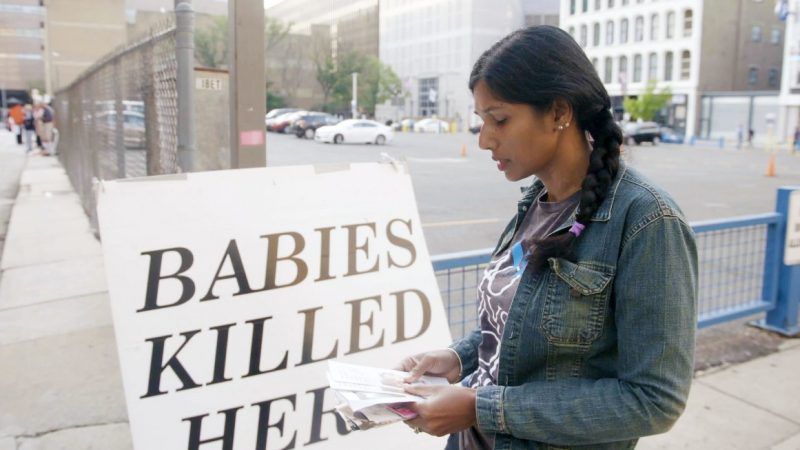The Abortion Divide Shows a Fight Growing Ever More Bitter
PBS documentary illustrates two sides pushing even further apart.

Frontline: The Abortion Divide. PBS. Tuesday, April 23, 10 p.m.
In 1983, in its first season, Frontline aired The Abortion Clinic, documentarian Mark Obenhaus' matter-of-fact chronicle of daily life (or, depending on your view, the daily taking of life) at a clinic in Darby, Pennsylvania.
Though the show created a stir by showing (albeit in a non-grisly fashion) two abortion procedures, mostly it was notable for demonstrating the flat disconnect between abortion supporters and opponents.
Thirty-six years later, Obenhaus is back in Darby (this time with co-producer Elizabeth Leiter) to take another look at the clinic and the pro-life demonstrators who cluster outside every day. His conclusion: When it comes to abortion, Darby is "even more bitterly divided than it was 36 years ago."
The "bitter" part is not so apparent—The Abortion Divide is mostly free of the muzzle-velocity rhetoric that dominates this issue—but the division is plain. The two sides, essentially, don't hear one another at all.
The pro-choice folks, in measured tones, suggest their opponents represent the eternal white male imperative to be the boss of everything and everybody. The pro-life people, on the other hand, think the places they're picketing are post-modernist Treblinkas and Auschwitzes.
"It's barbaric to chop a baby up, put it in a little canister, take it out and count the pieces," says one of the pro-life chiefs. "What kind of world have we entered into, where we do this to our children?"
There is no compromise between these two positions, and perhaps there shouldn't be. If you believe a fetus (or "pregnancy tissue," as some of the clinic personnel call it) is just an undifferentiated appendage like a tonsil or an appendix, then why should anybody else have any say about what you do with or to it?
And if you think it's a tiny person with a small heart but a full-sized soul—the Darby pro-lifers are virtually all devout Catholics—how could you ever countenance what happens to it inside an abortion clinic?
The Abortion Divide, scrupulously even-handed, makes no attempt to sort out the moral questions here, merely recounting their continued existence. And if the show were nothing more than a heat check on the debate—oh, man, they're still all mad—there would be little point to it. But Obenhaus and Leiter persuaded some of the women, both at the abortion clinic and a nearby facility for unwed mothers run by the pro-lifers, to talk about their feelings as they work through the question of what to do. Their thoughts are startling, sometimes maddening and nearly always touching.
A homeless woman at the unwed-mother refuge is something of a poster child for unlearned lessons; a recovered-for-the-moment drug addict, she has five children in foster homes, two living with her sisters, and a burbling new one in a crib by her side. "Now we're trying again," she says. "He's pretty special—ain't nobody taking this one." It's hard not to want to shake her and shout, "Grow up!" And harder still, watching mother and baby beam at one another, to not believe, just a little bit, in Carl Sandburg's axiom that "A baby is God's opinion that the world should go on."
Yet bad decisions do not respect socioeconomic boundary lines. Down the street at the abortion clinic, another woman, 30-ish and seemingly well-educated and well-heeled, has just learned she's carrying twins. With a palpable air of embarrassment, she admits the pregnancy is the result of a single act of unprotected sex and an unexpectedly hard-ass universe: "Surely, one time, I'd get some kind of a grace period on that."
She's hoping for better luck with the babies themselves—"a sense of peace … with these two beings I've chosen not to bring into the world." She imagines a chat with them before the abortion in which she tells them, "Thank you, and I'm honored to be given this gift of life. Unfortunately, I can't do it right now." The twins, alas, were not available to recount their their side of the conversation.
